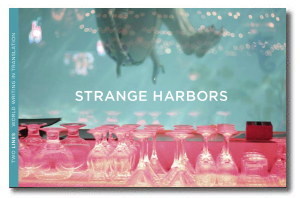
…and I’m a late poster, as usual. Grossman, Jull Costa, Venuti, Chris Andrews, Marilyn Hacker, Jessica Cohen, Alexis Levitin… what’s not to like?
Many sincere thanks to Franck Bessone and Kurt Bodden for graciously reading the excerpt from Patrick Besson’s Les Freres de la Consolation in the original French and my translation at the release party. Wish I could’ve been there!
STRANGE HARBORS
The 15th anniversary volume of TWO LINES World Writing in Translation
Edited by John Biguenet and Sidney Wade
Like sailing into new ports of call, Strange Harbors suggests that reading the world’s literature can ignite affinities across languages and literary traditions—and that the art of translation can distill familiar experiences from disparate lands.
Featuring a special focus on Turkish poetry, and an excerpt of Edith Grossman’s translation of Antonio Muñoz Molina’s early novel, A Manuscript of Ashes, Strange Harbors ferries poetry and fiction from eighteen languages and twenty-three countries to English readers.
Highlights include:
- A Catalonian twist on Edward Hopper’s noir Americana.
- Poems by a man who barely escaped the political terror in El Salvador.
- A story about the devastating legacy of Agent Orange on the people of Vietnam.
- A Romanian tale about a bizarre contest at a communist beach resort where the top prize is a paddleboat ride in the Black Sea with a teen beauty queen.
“These are works that could never have been written first in English, as their necessities so clearly reside in the soil and local waters of their cultures.” – Sidney Wade
About Strange Harbors
We tell ourselves it’s universal, storytelling. It is—except what it is a storyteller tells isn’t always and everywhere the same thing. Reading stories in translation, one soon begins to wonder, “What is a story?”
One might as well ask, “What is love?” We think it universal. We think we know what others mean when they use the word. But reading translated stories about love, who can keep from asking, “Can this be love, the thing the story—if it is a story—talks about?”
We concede we do not always understand ideas. What makes us think we understand emotions any better?
So we take ship in a vessel refitted in English to some strange harbor, where we might learn, at last, the answers to such questions. We never do, of course. And we journey on to the next harbor and the next, grateful to the shipwrights who have made our hopeless voyage possible.
—John Biguenet

Leave a Reply